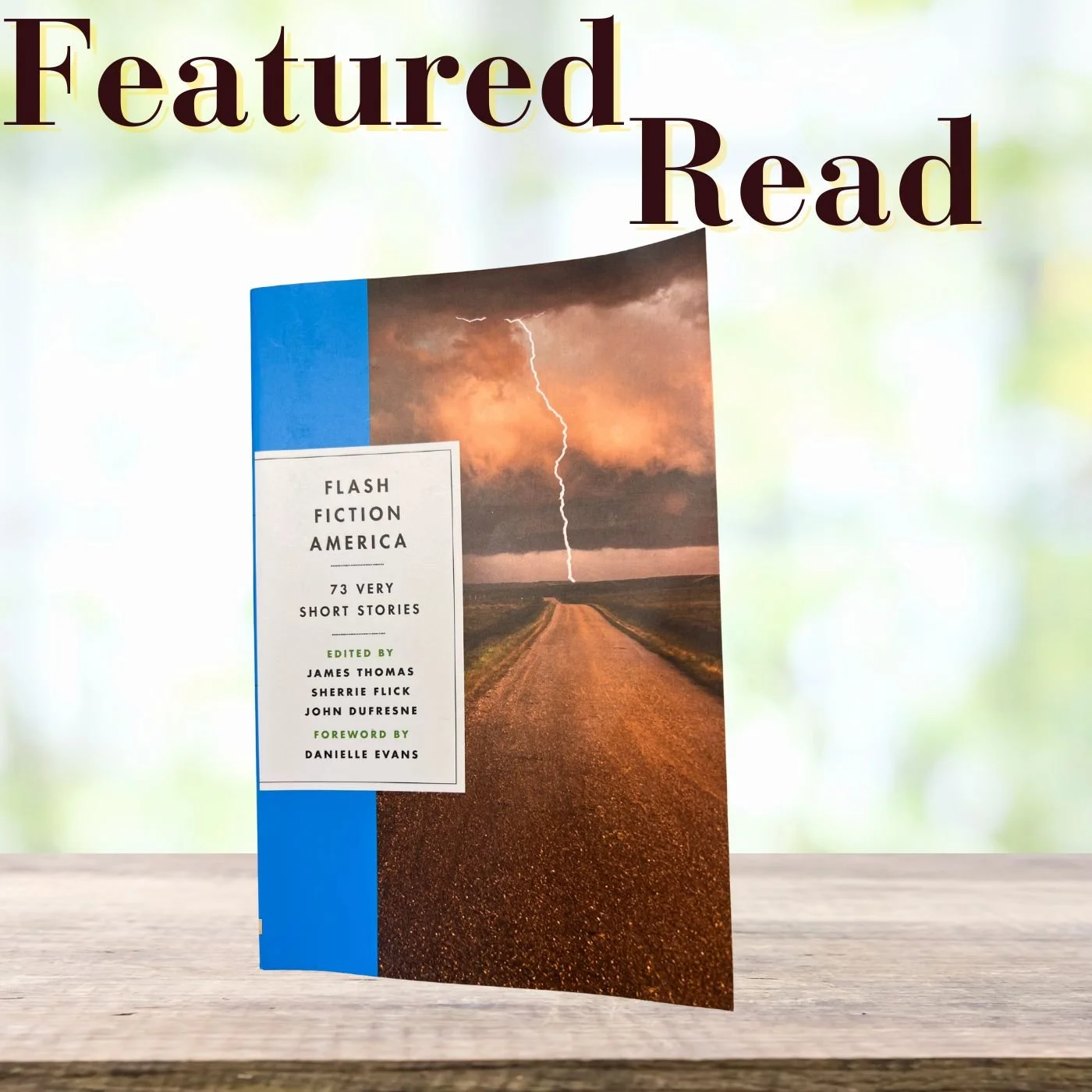Featured Read: Flash Fiction America edited by James Thomas, Sherrie Flick, & John Dufresne
“This book is a house with many small windows, but a door big enough to let everyone in. ”
What defines America today? Flash Fiction America: 73 Very Short Stories, edited by James Thomas, Sherrie Flick, and John Dufresne, with a foreword by Danielle Evans, explores this question, as its stories, each under 1,000 words, build a mosaic of what it means to live in America. This collection explores the diverse American culture, its recent social and political movements, love, death, sex, religion, and violence. Nothing is off-limits in these rich stories, which demonstrate the complexity of the human experience at this unique time in the United States.
In “I’m on the Side of the Wildebeest” by Amy Stuber, she confronts the new reality of America for her children: “There’s definitely a cruelty to the fact that my children’s childhood is this doomsday prophecy of climate change, micro-greens, ugly hybrids, and Trump, while mine was bell-bottoms, Twinkies, skateboarding, Soul Train, and only a shadowy sideline concern about possible nuclear war” (57). With one sentence, Stuber provides a vivid experience of how her children face a very different America, with an uncertain future.
I must admit, I’ve had limited experience with the form of flash fiction, but this book has me desperately wanting to read more. Despite the brevity, I was astounded by the level of nuance and precision in each story. Much like poetry, each sentence and each word within that sentence must be scrutinized to adhere to the short form. Diction and structure play a crucial role in packing depth within these insightful and layered pieces. The writers featured in Flash Fiction America use a variety of narrative strategies which keep the text true to its 73 distinct voices, as well as engaging and full of surprises.
I was enthralled by “The Logic of the Loaded Heart” by Amber Sparks, which reads as a series of word problems, complete with extra credit assignments. Sparks begins her story: “If John is three, and John’s mother is six times his age, how old was John’s mother when John was conceived in the back of Al Neil’s pickup truck after a Styx concert in Milwaukee?” (107) and continues to pose questions as John ages.
In “The Pregnancy Game” by Michelle Ross, she tackles how women continue to fight for their bodily autonomy in this country. Ross has a group of young girls play a game in which they are “pregnant” or “not pregnant,” and then roll dice to discover their fate: “The paper plate reads, ‘You ended up pregnant as a result of being raped. You got an abortion. But in your state, it’s illegal to get abortions in rape cases. In fact, your rapist can sue you for doing so, and that’s just what he’s done. Go back to start’” (89). The power of flash fiction is viscerally felt in this story by Ross, as it cleverly exposes the fears of young girls and grown women.
The stories in Flash Fiction America thrust their readers into the middle of the action, progressing with concise language and a sense of urgency, as they lead into an abrupt ending. These pieces selected by Thomas, Flick, and Dufresne leave us with new contemporary writers to research and read, rich stories that challenge our concept of America, and lasting questions. Sadia Quraeshi Shepard’s “Monsters,” asks the question, “What would it be like, I wondered, to live without fear?” (92). Flash Fiction America exposes and challenges fear in the United States but also immerses readers in a literary landscape that shows we are not alone in our fears, our hardships, or our joy.
Writing Prompt:
Another standout piece in Flash Fiction America is, “Shit Cassandra Saw That She Didn’t Tell the Trojans Because at That Point Fuck Them Anyway” (pg. 98) by Gwen E. Kirby. Cassandra, (yes, that one from Greek mythology) had the power of prophecy, but the curse that no one would believe her. Kirby’s feminist story imagines that Cassandra’s prophecies extend into the modern day. She incorporates lists to shape and deepen the narrative. Her word choices make insightful connections between the progress of women today and their similarities to women in ancient times. In one of her lists, Kirby writes, “Tampons. Jeans. Washing machines. The cordless Hitachi Magic Wand. Elastic hair ties. Mace. Epidurals” (100).
Write a poem inspired by “Shit Cassandra Saw That She Didn’t Tell the Trojans Because at That Point Fuck Them Anyway,” by using a list to shape the poem. Choose a title that provides context for the list poem and is unconventional or surprising, like the title for Kirby’s story. While writing your poem, combine the important elements of flash fiction such as beginning in the middle of the action, omission, and abrupt endings.
Happy writing!

